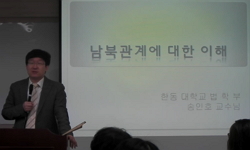2006년 북핵실험이 대북포용정책 탓이라는 주장은, 포용정책의 원래 대상이 남북관계이고 정책 목표 역시 남북관계 개선과 평화공존에 맞춰져 있으며 본질적으로 핵실험은 북미 적대관계의 ...
http://chineseinput.net/에서 pinyin(병음)방식으로 중국어를 변환할 수 있습니다.
변환된 중국어를 복사하여 사용하시면 됩니다.
- 中文 을 입력하시려면 zhongwen을 입력하시고 space를누르시면됩니다.
- 北京 을 입력하시려면 beijing을 입력하시고 space를 누르시면 됩니다.

북한의 핵실험과 대북포용정책 : 상관관계와 지속 필요성 = North Korea’s Nuclear Test and South Korea’s Engagement Policy: Correlations and the Need for Continuance
한글로보기https://www.riss.kr/link?id=A82683489
- 저자
- 발행기관
- 학술지명
- 권호사항
-
발행연도
2007
-
작성언어
Korean
- 주제어
-
KDC
340.5
-
등재정보
KCI등재
-
자료형태
학술저널
-
수록면
5-21(17쪽)
- 제공처
-
0
상세조회 -
0
다운로드
부가정보
국문 초록 (Abstract)
2006년 북핵실험이 대북포용정책 탓이라는 주장은, 포용정책의 원래 대상이 남북관계이고 정책 목표 역시 남북관계 개선과 평화공존에 맞춰져 있으며 본질적으로 핵실험은 북미 적대관계의 부정적 산물이라는 점을 감안할 때 직접 연관되지 않는, 서로 차원이 다른 두 가지를 억지로 연계했다는 점에서 지나친 비약이 된다. 물론 포용정책을 통한 남북관계 개선이 북미관계와 북핵문제 해결에 긍정적인 환경을 만들 수는 있지만, 포용정책이 북핵문제 해결을 자동적으로 보장하는 필요충분조건은 아니다. 포용정책 때문에 핵실험을 한 게 아니라 남북관계의 대북포용 기조와 달리 북미관계에서 대북 강경이 지배하고 북미대결이 심화되면서 핵실험이 결과된 것이다. 또한 북한의 핵실험이 포용정책의 실패라는 주장은 역으로 포용정책이 성공했다면 북한의 핵실험을 막을 수 있다는 논리가 되는 바, 이는 지금까지 일관된 포용정책 하에서도 때로는 북미 합의가 도출되기도 하고 때로는 핵실험과 같은 극단적 대결이 나타나는 등 엇갈린 결과가 도출되었다는 점에서 별 설득력이 없다. 그러나 핵실험에도 불구하고 포용정책은 지속되어야 하지만 그렇다고 해서 과거의 것을 그대로 답습하는 것이어서는 안 된다. 이 점에서 향후 대북정책은 포용의 원칙을 견지하면서도 이른바 ‘원칙 있는 포용’의 기조를 확고히 해야 한다.
다국어 초록 (Multilingual Abstract)
The assertion that the North Korean nuclear test in 2006 was due to South Korea’s policy of engagement is a leap of logic, a forced connection between two separate things. This can be seen when considering that the focus of the engagement policy is ...
The assertion that the North Korean nuclear test in 2006 was due to South Korea’s policy of engagement is a leap of logic, a forced connection between two separate things. This can be seen when considering that the focus of the engagement policy is Inter-Korean relations, and that its goals are peaceful coexistence and the improvement of relations on the peninsula. The nuclear test was fundamentally a negative result of hostile relations between North Korea and the U.S. Clearly, the improvement of Inter-Korean relations through engagement can create a positive environment for the resolution of the nuclear issue, but such a policy is not a necessary and sufficient condition that automatically guarantees a solution. The nuclear test was not a product of Seoul’s policy of engagement; rather it was a result of the worsening DPRK-U.S. standoff and U.S. pressure against the North, in contrast to the tolerance that characterized Inter-Korean relations. Furthermore, the arguments that the nuclear test represents a failure of the engagement policy lacks persuasiveness when viewed in converse: if the policy had been a success, then it could have prevented the nuclear test. However, South Korea’s consistent engagement has seen completely different outcomes, at times agreement between North Korea and the U.S. and at times extreme opposition such as the nuclear test. The policy of engagement must be continued regardless of the nuclear test, but it should not merely follow the same path. Henceforth, South Korea’s policy towards the North should adhere to engagement while having so-called “principled engagement” as its basis.
목차 (Table of Contents)
- 요약
- Ⅰ. 핵실험의 후폭풍: 포용정책 논란
- Ⅱ. 노무현 정부의 북핵 정책: 성과와 한계
- Ⅲ. 대북포용정책과 핵실험의 상관관계
- Ⅴ. 포용정책의 지속 필요성
- 요약
- Ⅰ. 핵실험의 후폭풍: 포용정책 논란
- Ⅱ. 노무현 정부의 북핵 정책: 성과와 한계
- Ⅲ. 대북포용정책과 핵실험의 상관관계
- Ⅴ. 포용정책의 지속 필요성
- Ⅴ. 결론에 대신하여: 원칙 있는 포용
- 참고문헌
- Abstract
동일학술지(권/호) 다른 논문
-
북한의 벼랑 끝 전술과 미국의 미사일 방어체제의 상호관계
- 고려대학교 평화연구소
- 조한승(Cho HanSeung)
- 2007
- KCI등재
-
- 고려대학교 평화연구소
- 김종수(Kim Jong Su)
- 2007
- KCI등재
-
- 고려대학교 평화연구소
- 라미경(Ra Mi-Kyung)
- 2007
- KCI등재
-
- 고려대학교 평화연구소
- 박종철(Park Jongchul)
- 2007
- KCI등재




 DBpia
DBpia




